Transtheoretical Model of Change and Motivation
VerifiedAdded on 2022/11/07
|8
|2075
|218
AI Summary
This case study discusses the Trans theoretical model of change and motivation and how it can be applied to sustain change. It focuses on the various stages of change and how they can be used to support Harry in adapting new feeding habits.
Contribute Materials
Your contribution can guide someone’s learning journey. Share your
documents today.
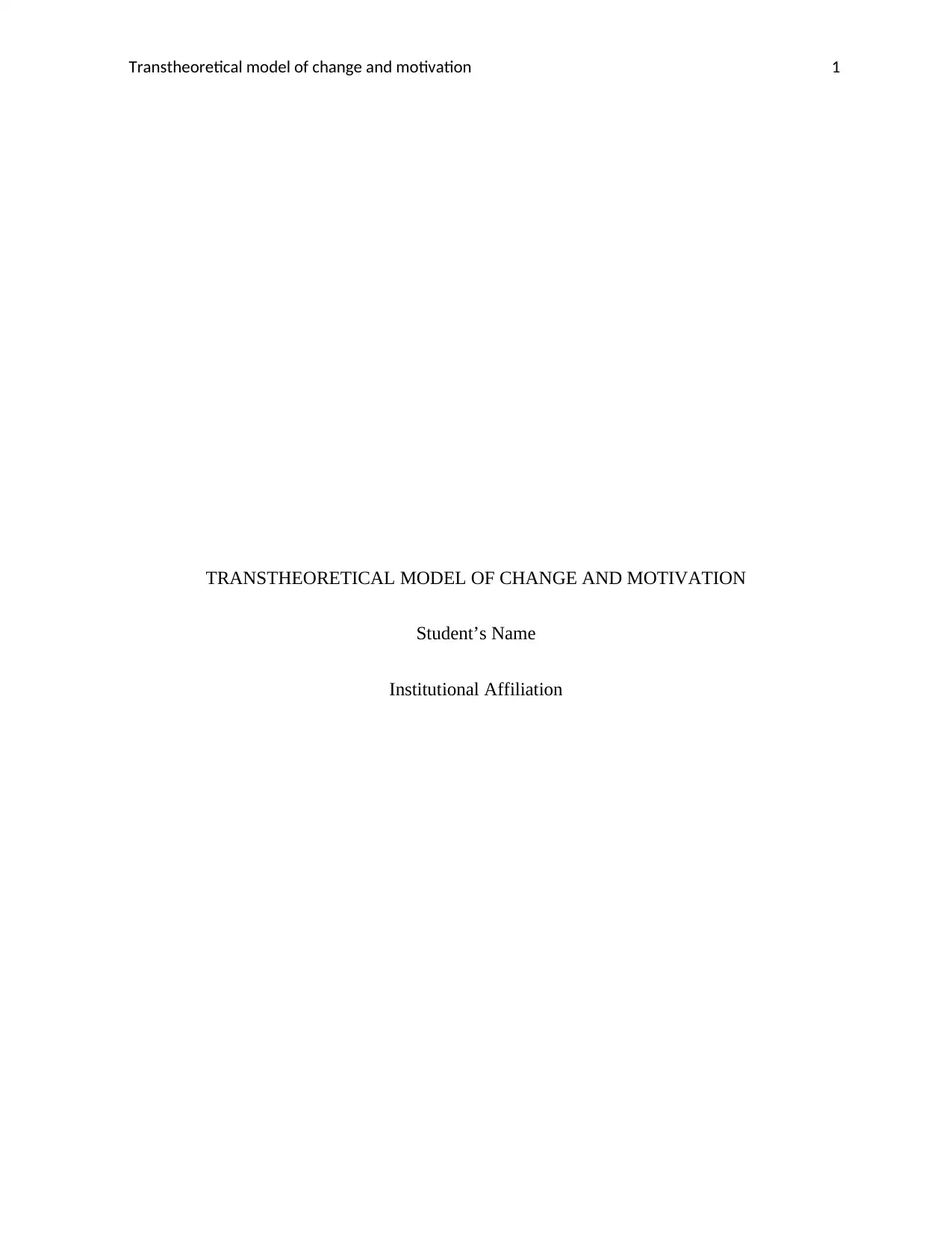
Transtheoretical model of change and motivation 1
TRANSTHEORETICAL MODEL OF CHANGE AND MOTIVATION
Student’s Name
Institutional Affiliation
TRANSTHEORETICAL MODEL OF CHANGE AND MOTIVATION
Student’s Name
Institutional Affiliation
Secure Best Marks with AI Grader
Need help grading? Try our AI Grader for instant feedback on your assignments.
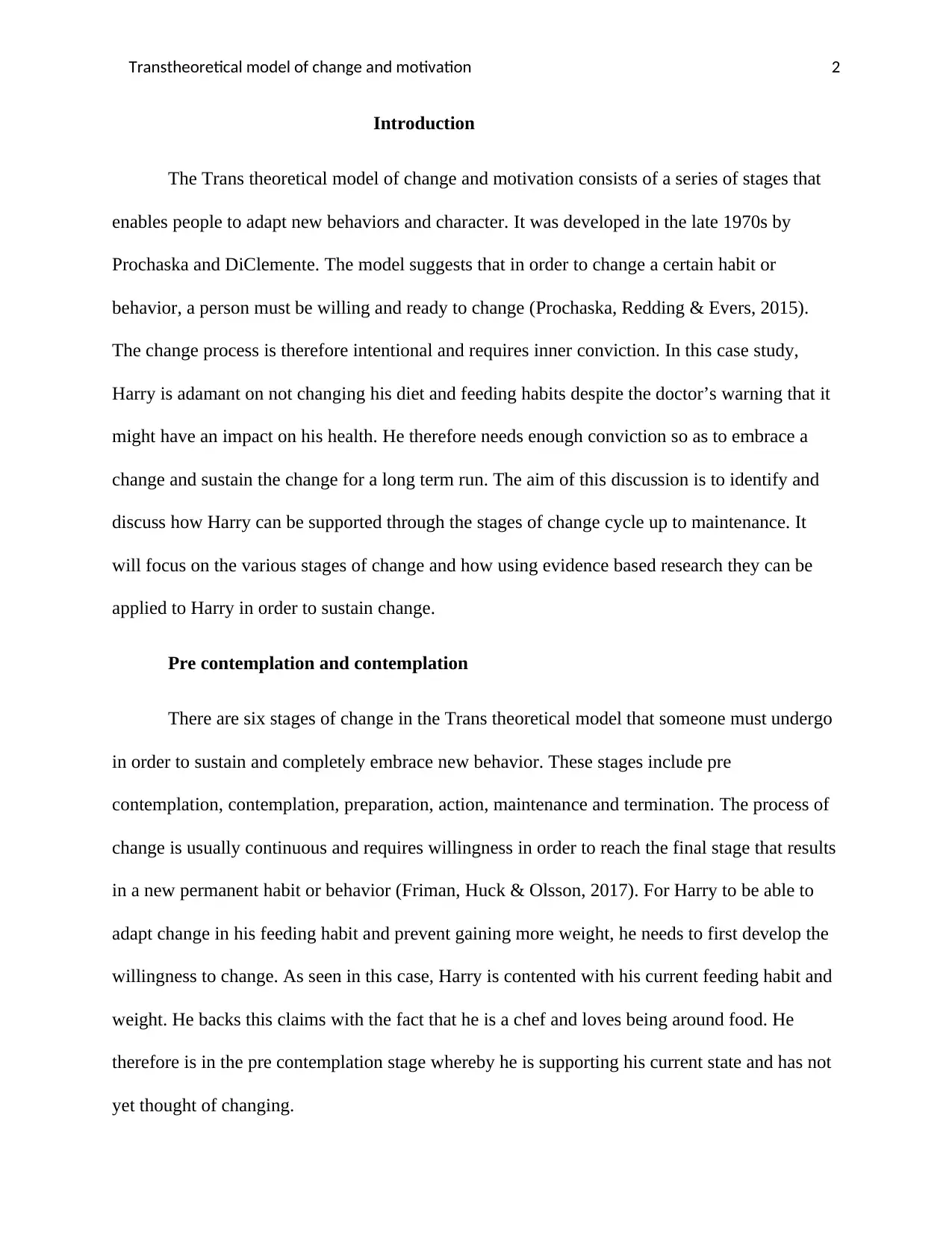
Transtheoretical model of change and motivation 2
Introduction
The Trans theoretical model of change and motivation consists of a series of stages that
enables people to adapt new behaviors and character. It was developed in the late 1970s by
Prochaska and DiClemente. The model suggests that in order to change a certain habit or
behavior, a person must be willing and ready to change (Prochaska, Redding & Evers, 2015).
The change process is therefore intentional and requires inner conviction. In this case study,
Harry is adamant on not changing his diet and feeding habits despite the doctor’s warning that it
might have an impact on his health. He therefore needs enough conviction so as to embrace a
change and sustain the change for a long term run. The aim of this discussion is to identify and
discuss how Harry can be supported through the stages of change cycle up to maintenance. It
will focus on the various stages of change and how using evidence based research they can be
applied to Harry in order to sustain change.
Pre contemplation and contemplation
There are six stages of change in the Trans theoretical model that someone must undergo
in order to sustain and completely embrace new behavior. These stages include pre
contemplation, contemplation, preparation, action, maintenance and termination. The process of
change is usually continuous and requires willingness in order to reach the final stage that results
in a new permanent habit or behavior (Friman, Huck & Olsson, 2017). For Harry to be able to
adapt change in his feeding habit and prevent gaining more weight, he needs to first develop the
willingness to change. As seen in this case, Harry is contented with his current feeding habit and
weight. He backs this claims with the fact that he is a chef and loves being around food. He
therefore is in the pre contemplation stage whereby he is supporting his current state and has not
yet thought of changing.
Introduction
The Trans theoretical model of change and motivation consists of a series of stages that
enables people to adapt new behaviors and character. It was developed in the late 1970s by
Prochaska and DiClemente. The model suggests that in order to change a certain habit or
behavior, a person must be willing and ready to change (Prochaska, Redding & Evers, 2015).
The change process is therefore intentional and requires inner conviction. In this case study,
Harry is adamant on not changing his diet and feeding habits despite the doctor’s warning that it
might have an impact on his health. He therefore needs enough conviction so as to embrace a
change and sustain the change for a long term run. The aim of this discussion is to identify and
discuss how Harry can be supported through the stages of change cycle up to maintenance. It
will focus on the various stages of change and how using evidence based research they can be
applied to Harry in order to sustain change.
Pre contemplation and contemplation
There are six stages of change in the Trans theoretical model that someone must undergo
in order to sustain and completely embrace new behavior. These stages include pre
contemplation, contemplation, preparation, action, maintenance and termination. The process of
change is usually continuous and requires willingness in order to reach the final stage that results
in a new permanent habit or behavior (Friman, Huck & Olsson, 2017). For Harry to be able to
adapt change in his feeding habit and prevent gaining more weight, he needs to first develop the
willingness to change. As seen in this case, Harry is contented with his current feeding habit and
weight. He backs this claims with the fact that he is a chef and loves being around food. He
therefore is in the pre contemplation stage whereby he is supporting his current state and has not
yet thought of changing.
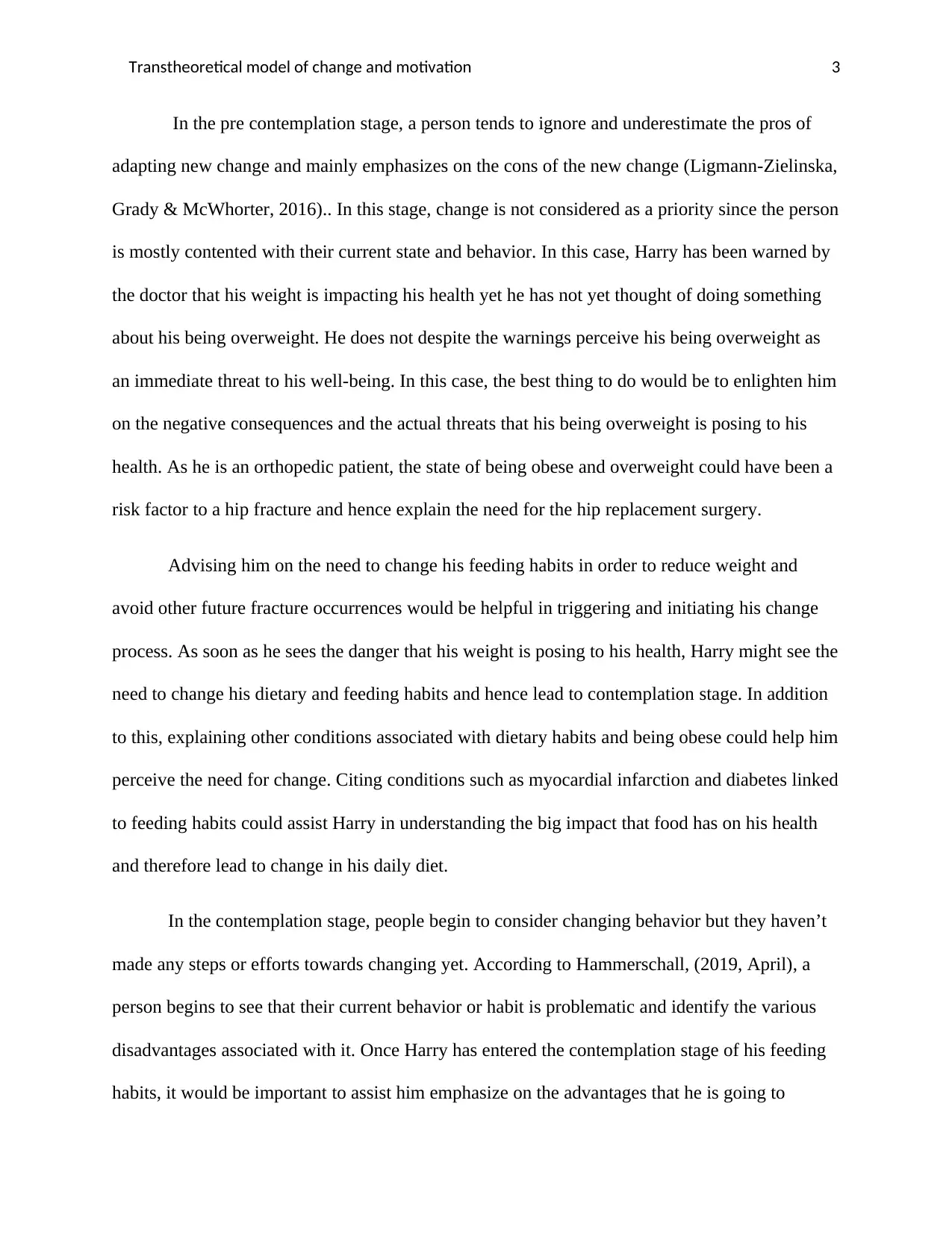
Transtheoretical model of change and motivation 3
In the pre contemplation stage, a person tends to ignore and underestimate the pros of
adapting new change and mainly emphasizes on the cons of the new change (Ligmann-Zielinska,
Grady & McWhorter, 2016).. In this stage, change is not considered as a priority since the person
is mostly contented with their current state and behavior. In this case, Harry has been warned by
the doctor that his weight is impacting his health yet he has not yet thought of doing something
about his being overweight. He does not despite the warnings perceive his being overweight as
an immediate threat to his well-being. In this case, the best thing to do would be to enlighten him
on the negative consequences and the actual threats that his being overweight is posing to his
health. As he is an orthopedic patient, the state of being obese and overweight could have been a
risk factor to a hip fracture and hence explain the need for the hip replacement surgery.
Advising him on the need to change his feeding habits in order to reduce weight and
avoid other future fracture occurrences would be helpful in triggering and initiating his change
process. As soon as he sees the danger that his weight is posing to his health, Harry might see the
need to change his dietary and feeding habits and hence lead to contemplation stage. In addition
to this, explaining other conditions associated with dietary habits and being obese could help him
perceive the need for change. Citing conditions such as myocardial infarction and diabetes linked
to feeding habits could assist Harry in understanding the big impact that food has on his health
and therefore lead to change in his daily diet.
In the contemplation stage, people begin to consider changing behavior but they haven’t
made any steps or efforts towards changing yet. According to Hammerschall, (2019, April), a
person begins to see that their current behavior or habit is problematic and identify the various
disadvantages associated with it. Once Harry has entered the contemplation stage of his feeding
habits, it would be important to assist him emphasize on the advantages that he is going to
In the pre contemplation stage, a person tends to ignore and underestimate the pros of
adapting new change and mainly emphasizes on the cons of the new change (Ligmann-Zielinska,
Grady & McWhorter, 2016).. In this stage, change is not considered as a priority since the person
is mostly contented with their current state and behavior. In this case, Harry has been warned by
the doctor that his weight is impacting his health yet he has not yet thought of doing something
about his being overweight. He does not despite the warnings perceive his being overweight as
an immediate threat to his well-being. In this case, the best thing to do would be to enlighten him
on the negative consequences and the actual threats that his being overweight is posing to his
health. As he is an orthopedic patient, the state of being obese and overweight could have been a
risk factor to a hip fracture and hence explain the need for the hip replacement surgery.
Advising him on the need to change his feeding habits in order to reduce weight and
avoid other future fracture occurrences would be helpful in triggering and initiating his change
process. As soon as he sees the danger that his weight is posing to his health, Harry might see the
need to change his dietary and feeding habits and hence lead to contemplation stage. In addition
to this, explaining other conditions associated with dietary habits and being obese could help him
perceive the need for change. Citing conditions such as myocardial infarction and diabetes linked
to feeding habits could assist Harry in understanding the big impact that food has on his health
and therefore lead to change in his daily diet.
In the contemplation stage, people begin to consider changing behavior but they haven’t
made any steps or efforts towards changing yet. According to Hammerschall, (2019, April), a
person begins to see that their current behavior or habit is problematic and identify the various
disadvantages associated with it. Once Harry has entered the contemplation stage of his feeding
habits, it would be important to assist him emphasize on the advantages that he is going to
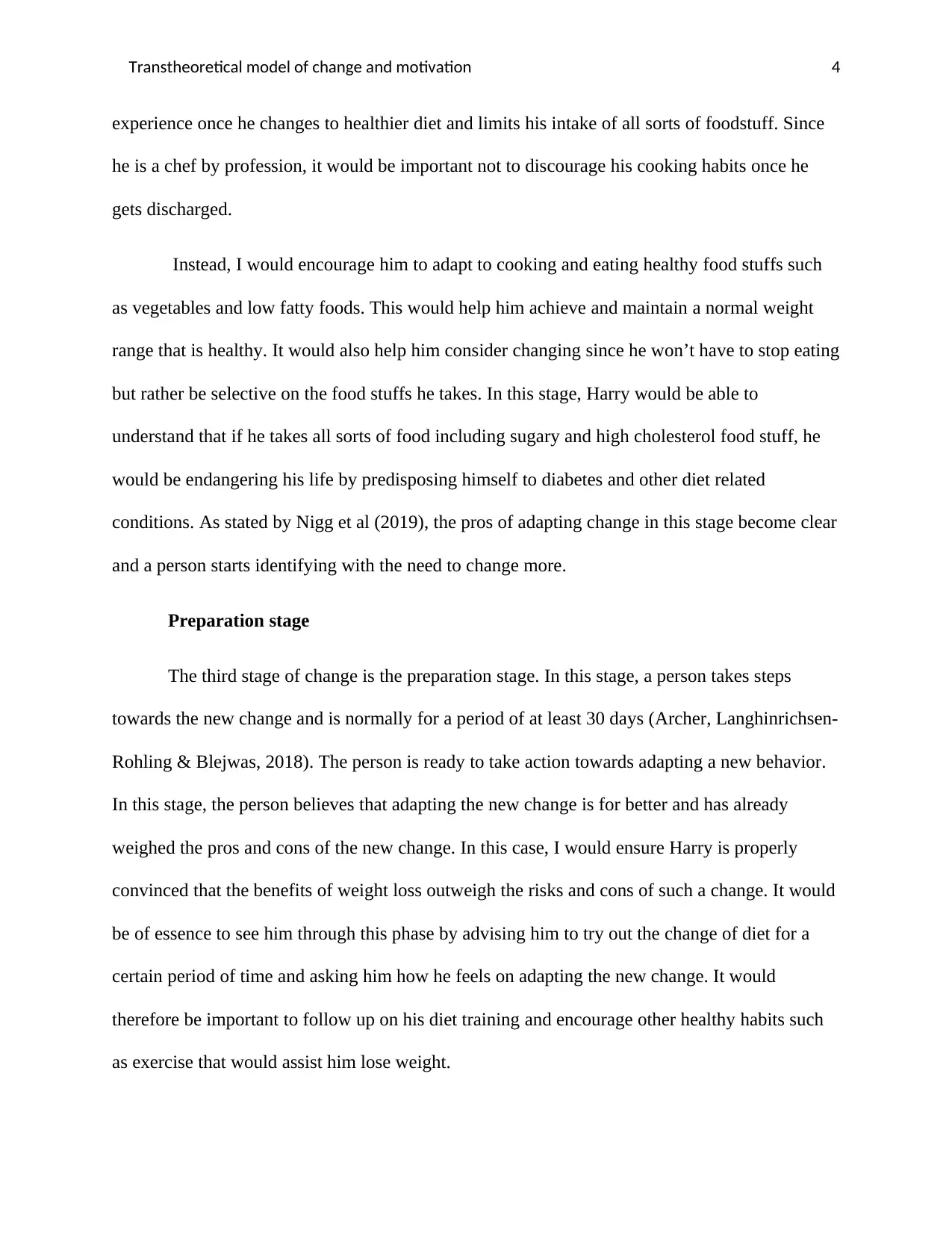
Transtheoretical model of change and motivation 4
experience once he changes to healthier diet and limits his intake of all sorts of foodstuff. Since
he is a chef by profession, it would be important not to discourage his cooking habits once he
gets discharged.
Instead, I would encourage him to adapt to cooking and eating healthy food stuffs such
as vegetables and low fatty foods. This would help him achieve and maintain a normal weight
range that is healthy. It would also help him consider changing since he won’t have to stop eating
but rather be selective on the food stuffs he takes. In this stage, Harry would be able to
understand that if he takes all sorts of food including sugary and high cholesterol food stuff, he
would be endangering his life by predisposing himself to diabetes and other diet related
conditions. As stated by Nigg et al (2019), the pros of adapting change in this stage become clear
and a person starts identifying with the need to change more.
Preparation stage
The third stage of change is the preparation stage. In this stage, a person takes steps
towards the new change and is normally for a period of at least 30 days (Archer, Langhinrichsen-
Rohling & Blejwas, 2018). The person is ready to take action towards adapting a new behavior.
In this stage, the person believes that adapting the new change is for better and has already
weighed the pros and cons of the new change. In this case, I would ensure Harry is properly
convinced that the benefits of weight loss outweigh the risks and cons of such a change. It would
be of essence to see him through this phase by advising him to try out the change of diet for a
certain period of time and asking him how he feels on adapting the new change. It would
therefore be important to follow up on his diet training and encourage other healthy habits such
as exercise that would assist him lose weight.
experience once he changes to healthier diet and limits his intake of all sorts of foodstuff. Since
he is a chef by profession, it would be important not to discourage his cooking habits once he
gets discharged.
Instead, I would encourage him to adapt to cooking and eating healthy food stuffs such
as vegetables and low fatty foods. This would help him achieve and maintain a normal weight
range that is healthy. It would also help him consider changing since he won’t have to stop eating
but rather be selective on the food stuffs he takes. In this stage, Harry would be able to
understand that if he takes all sorts of food including sugary and high cholesterol food stuff, he
would be endangering his life by predisposing himself to diabetes and other diet related
conditions. As stated by Nigg et al (2019), the pros of adapting change in this stage become clear
and a person starts identifying with the need to change more.
Preparation stage
The third stage of change is the preparation stage. In this stage, a person takes steps
towards the new change and is normally for a period of at least 30 days (Archer, Langhinrichsen-
Rohling & Blejwas, 2018). The person is ready to take action towards adapting a new behavior.
In this stage, the person believes that adapting the new change is for better and has already
weighed the pros and cons of the new change. In this case, I would ensure Harry is properly
convinced that the benefits of weight loss outweigh the risks and cons of such a change. It would
be of essence to see him through this phase by advising him to try out the change of diet for a
certain period of time and asking him how he feels on adapting the new change. It would
therefore be important to follow up on his diet training and encourage other healthy habits such
as exercise that would assist him lose weight.
Secure Best Marks with AI Grader
Need help grading? Try our AI Grader for instant feedback on your assignments.
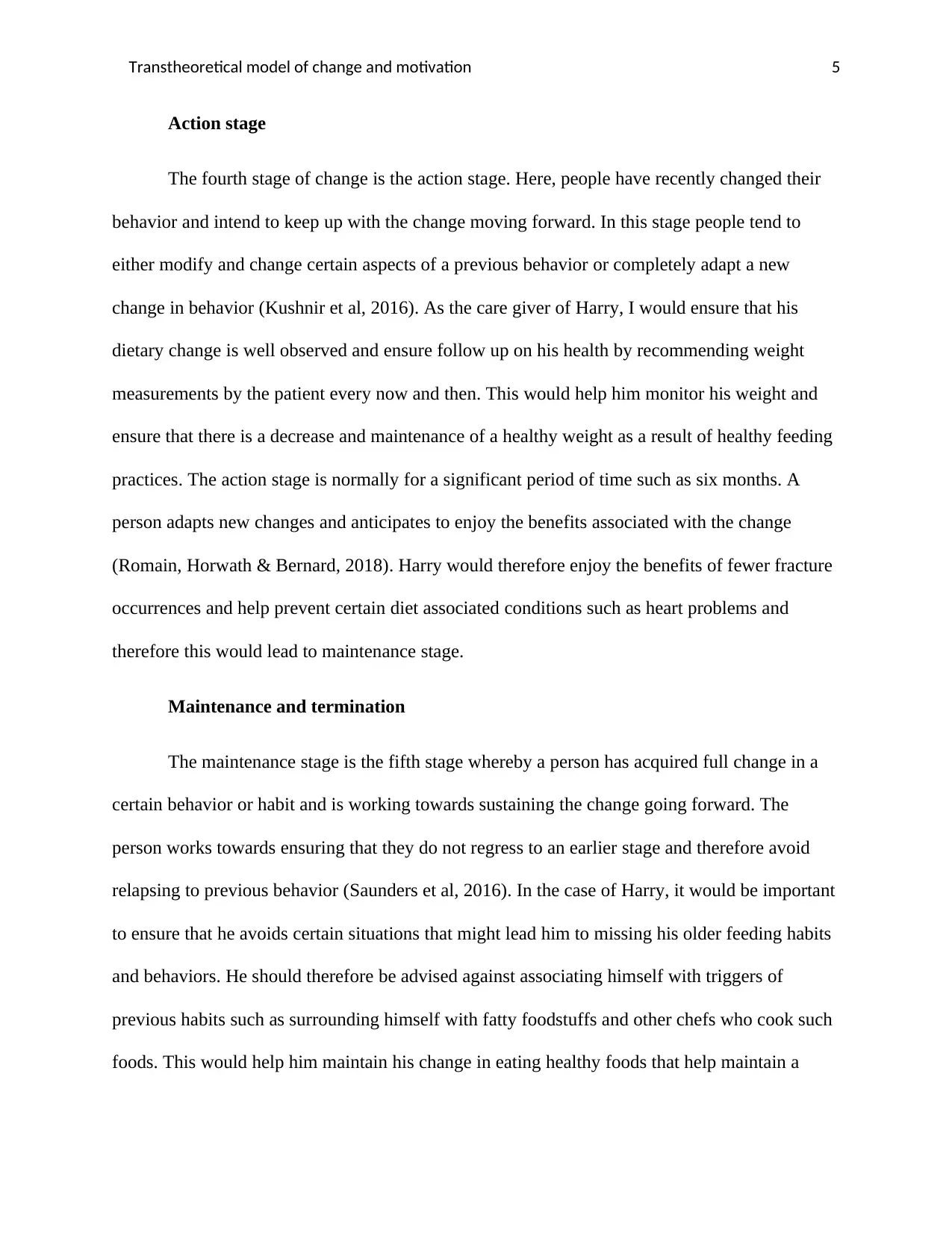
Transtheoretical model of change and motivation 5
Action stage
The fourth stage of change is the action stage. Here, people have recently changed their
behavior and intend to keep up with the change moving forward. In this stage people tend to
either modify and change certain aspects of a previous behavior or completely adapt a new
change in behavior (Kushnir et al, 2016). As the care giver of Harry, I would ensure that his
dietary change is well observed and ensure follow up on his health by recommending weight
measurements by the patient every now and then. This would help him monitor his weight and
ensure that there is a decrease and maintenance of a healthy weight as a result of healthy feeding
practices. The action stage is normally for a significant period of time such as six months. A
person adapts new changes and anticipates to enjoy the benefits associated with the change
(Romain, Horwath & Bernard, 2018). Harry would therefore enjoy the benefits of fewer fracture
occurrences and help prevent certain diet associated conditions such as heart problems and
therefore this would lead to maintenance stage.
Maintenance and termination
The maintenance stage is the fifth stage whereby a person has acquired full change in a
certain behavior or habit and is working towards sustaining the change going forward. The
person works towards ensuring that they do not regress to an earlier stage and therefore avoid
relapsing to previous behavior (Saunders et al, 2016). In the case of Harry, it would be important
to ensure that he avoids certain situations that might lead him to missing his older feeding habits
and behaviors. He should therefore be advised against associating himself with triggers of
previous habits such as surrounding himself with fatty foodstuffs and other chefs who cook such
foods. This would help him maintain his change in eating healthy foods that help maintain a
Action stage
The fourth stage of change is the action stage. Here, people have recently changed their
behavior and intend to keep up with the change moving forward. In this stage people tend to
either modify and change certain aspects of a previous behavior or completely adapt a new
change in behavior (Kushnir et al, 2016). As the care giver of Harry, I would ensure that his
dietary change is well observed and ensure follow up on his health by recommending weight
measurements by the patient every now and then. This would help him monitor his weight and
ensure that there is a decrease and maintenance of a healthy weight as a result of healthy feeding
practices. The action stage is normally for a significant period of time such as six months. A
person adapts new changes and anticipates to enjoy the benefits associated with the change
(Romain, Horwath & Bernard, 2018). Harry would therefore enjoy the benefits of fewer fracture
occurrences and help prevent certain diet associated conditions such as heart problems and
therefore this would lead to maintenance stage.
Maintenance and termination
The maintenance stage is the fifth stage whereby a person has acquired full change in a
certain behavior or habit and is working towards sustaining the change going forward. The
person works towards ensuring that they do not regress to an earlier stage and therefore avoid
relapsing to previous behavior (Saunders et al, 2016). In the case of Harry, it would be important
to ensure that he avoids certain situations that might lead him to missing his older feeding habits
and behaviors. He should therefore be advised against associating himself with triggers of
previous habits such as surrounding himself with fatty foodstuffs and other chefs who cook such
foods. This would help him maintain his change in eating healthy foods that help maintain a
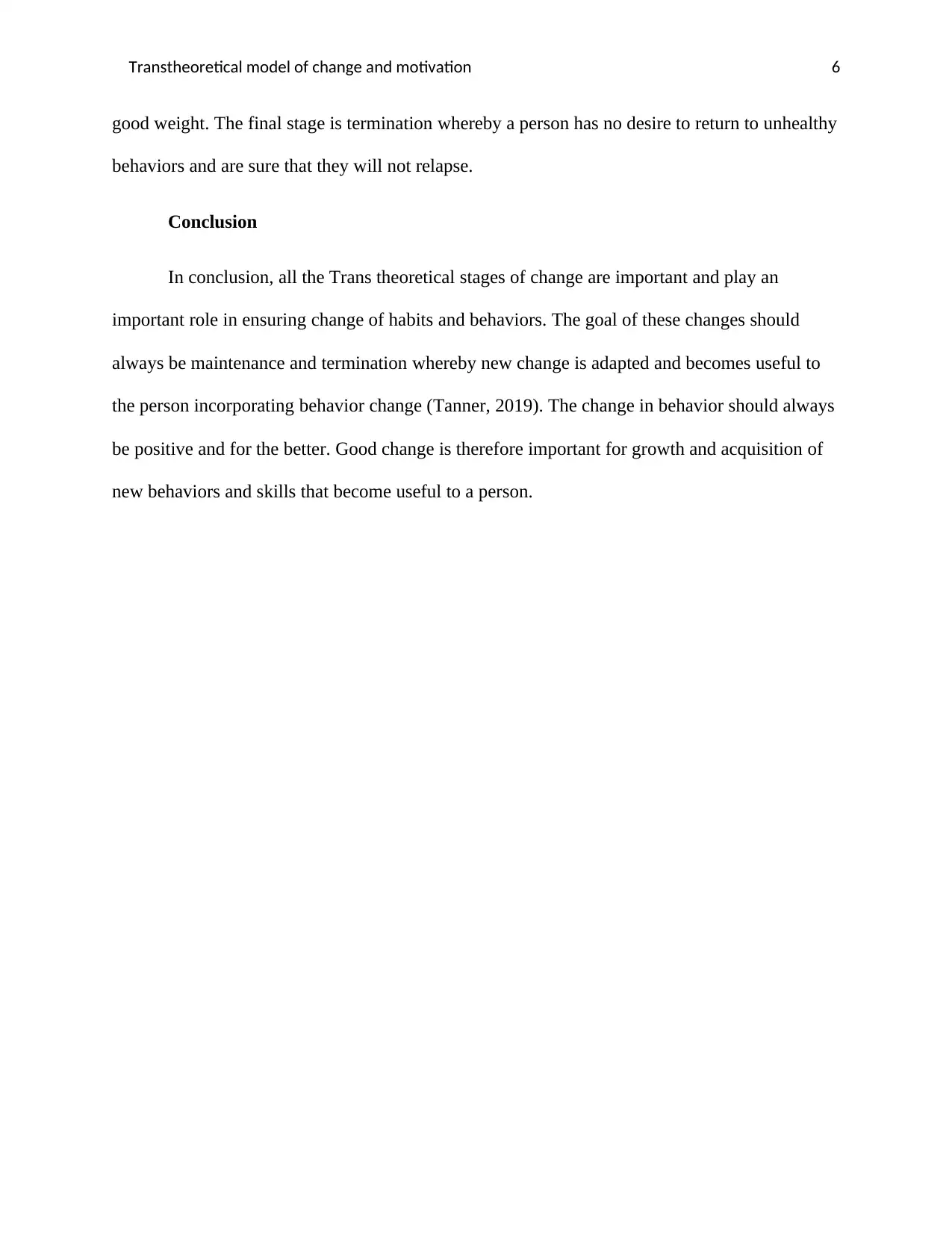
Transtheoretical model of change and motivation 6
good weight. The final stage is termination whereby a person has no desire to return to unhealthy
behaviors and are sure that they will not relapse.
Conclusion
In conclusion, all the Trans theoretical stages of change are important and play an
important role in ensuring change of habits and behaviors. The goal of these changes should
always be maintenance and termination whereby new change is adapted and becomes useful to
the person incorporating behavior change (Tanner, 2019). The change in behavior should always
be positive and for the better. Good change is therefore important for growth and acquisition of
new behaviors and skills that become useful to a person.
good weight. The final stage is termination whereby a person has no desire to return to unhealthy
behaviors and are sure that they will not relapse.
Conclusion
In conclusion, all the Trans theoretical stages of change are important and play an
important role in ensuring change of habits and behaviors. The goal of these changes should
always be maintenance and termination whereby new change is adapted and becomes useful to
the person incorporating behavior change (Tanner, 2019). The change in behavior should always
be positive and for the better. Good change is therefore important for growth and acquisition of
new behaviors and skills that become useful to a person.
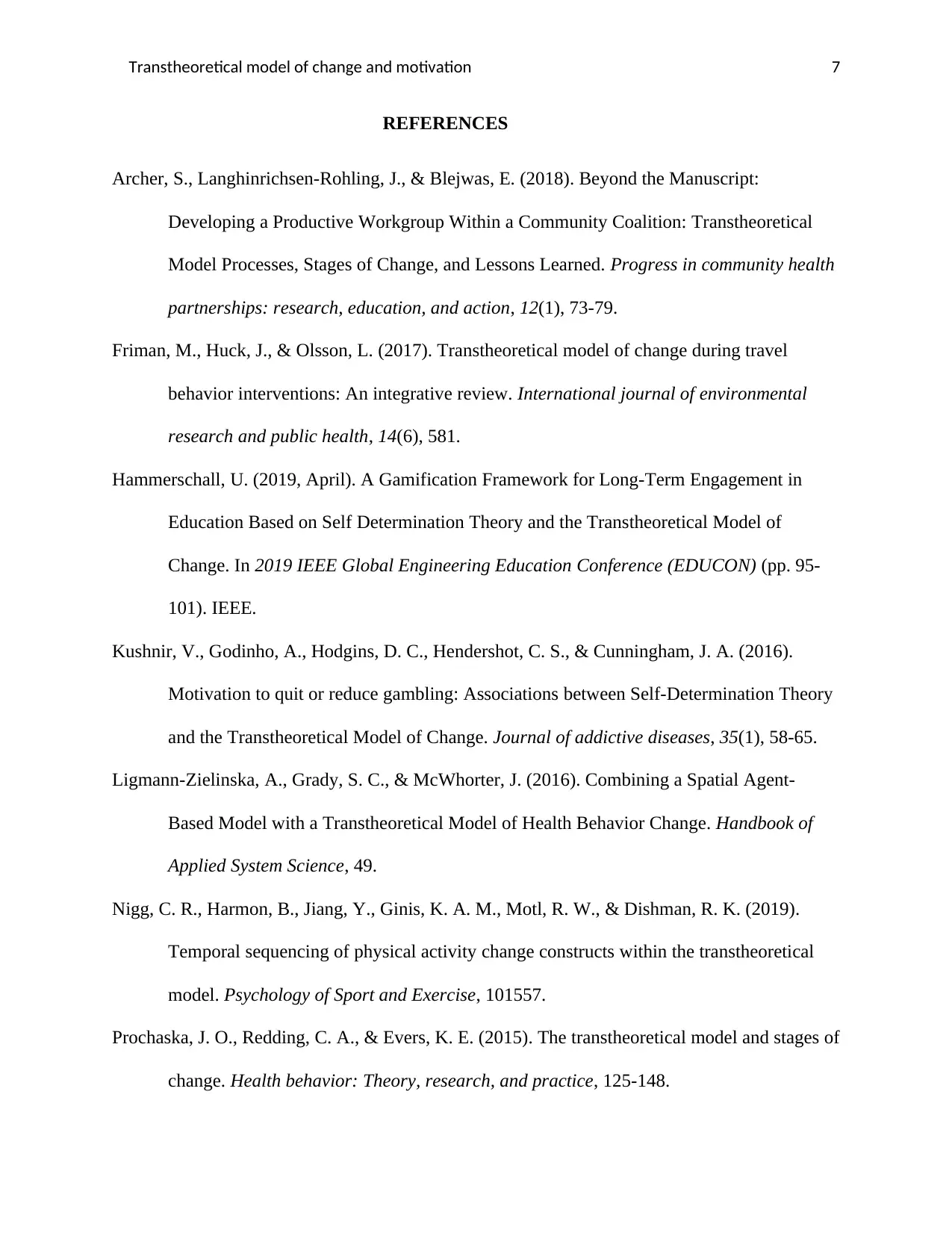
Transtheoretical model of change and motivation 7
REFERENCES
Archer, S., Langhinrichsen-Rohling, J., & Blejwas, E. (2018). Beyond the Manuscript:
Developing a Productive Workgroup Within a Community Coalition: Transtheoretical
Model Processes, Stages of Change, and Lessons Learned. Progress in community health
partnerships: research, education, and action, 12(1), 73-79.
Friman, M., Huck, J., & Olsson, L. (2017). Transtheoretical model of change during travel
behavior interventions: An integrative review. International journal of environmental
research and public health, 14(6), 581.
Hammerschall, U. (2019, April). A Gamification Framework for Long-Term Engagement in
Education Based on Self Determination Theory and the Transtheoretical Model of
Change. In 2019 IEEE Global Engineering Education Conference (EDUCON) (pp. 95-
101). IEEE.
Kushnir, V., Godinho, A., Hodgins, D. C., Hendershot, C. S., & Cunningham, J. A. (2016).
Motivation to quit or reduce gambling: Associations between Self-Determination Theory
and the Transtheoretical Model of Change. Journal of addictive diseases, 35(1), 58-65.
Ligmann-Zielinska, A., Grady, S. C., & McWhorter, J. (2016). Combining a Spatial Agent-
Based Model with a Transtheoretical Model of Health Behavior Change. Handbook of
Applied System Science, 49.
Nigg, C. R., Harmon, B., Jiang, Y., Ginis, K. A. M., Motl, R. W., & Dishman, R. K. (2019).
Temporal sequencing of physical activity change constructs within the transtheoretical
model. Psychology of Sport and Exercise, 101557.
Prochaska, J. O., Redding, C. A., & Evers, K. E. (2015). The transtheoretical model and stages of
change. Health behavior: Theory, research, and practice, 125-148.
REFERENCES
Archer, S., Langhinrichsen-Rohling, J., & Blejwas, E. (2018). Beyond the Manuscript:
Developing a Productive Workgroup Within a Community Coalition: Transtheoretical
Model Processes, Stages of Change, and Lessons Learned. Progress in community health
partnerships: research, education, and action, 12(1), 73-79.
Friman, M., Huck, J., & Olsson, L. (2017). Transtheoretical model of change during travel
behavior interventions: An integrative review. International journal of environmental
research and public health, 14(6), 581.
Hammerschall, U. (2019, April). A Gamification Framework for Long-Term Engagement in
Education Based on Self Determination Theory and the Transtheoretical Model of
Change. In 2019 IEEE Global Engineering Education Conference (EDUCON) (pp. 95-
101). IEEE.
Kushnir, V., Godinho, A., Hodgins, D. C., Hendershot, C. S., & Cunningham, J. A. (2016).
Motivation to quit or reduce gambling: Associations between Self-Determination Theory
and the Transtheoretical Model of Change. Journal of addictive diseases, 35(1), 58-65.
Ligmann-Zielinska, A., Grady, S. C., & McWhorter, J. (2016). Combining a Spatial Agent-
Based Model with a Transtheoretical Model of Health Behavior Change. Handbook of
Applied System Science, 49.
Nigg, C. R., Harmon, B., Jiang, Y., Ginis, K. A. M., Motl, R. W., & Dishman, R. K. (2019).
Temporal sequencing of physical activity change constructs within the transtheoretical
model. Psychology of Sport and Exercise, 101557.
Prochaska, J. O., Redding, C. A., & Evers, K. E. (2015). The transtheoretical model and stages of
change. Health behavior: Theory, research, and practice, 125-148.
Paraphrase This Document
Need a fresh take? Get an instant paraphrase of this document with our AI Paraphraser
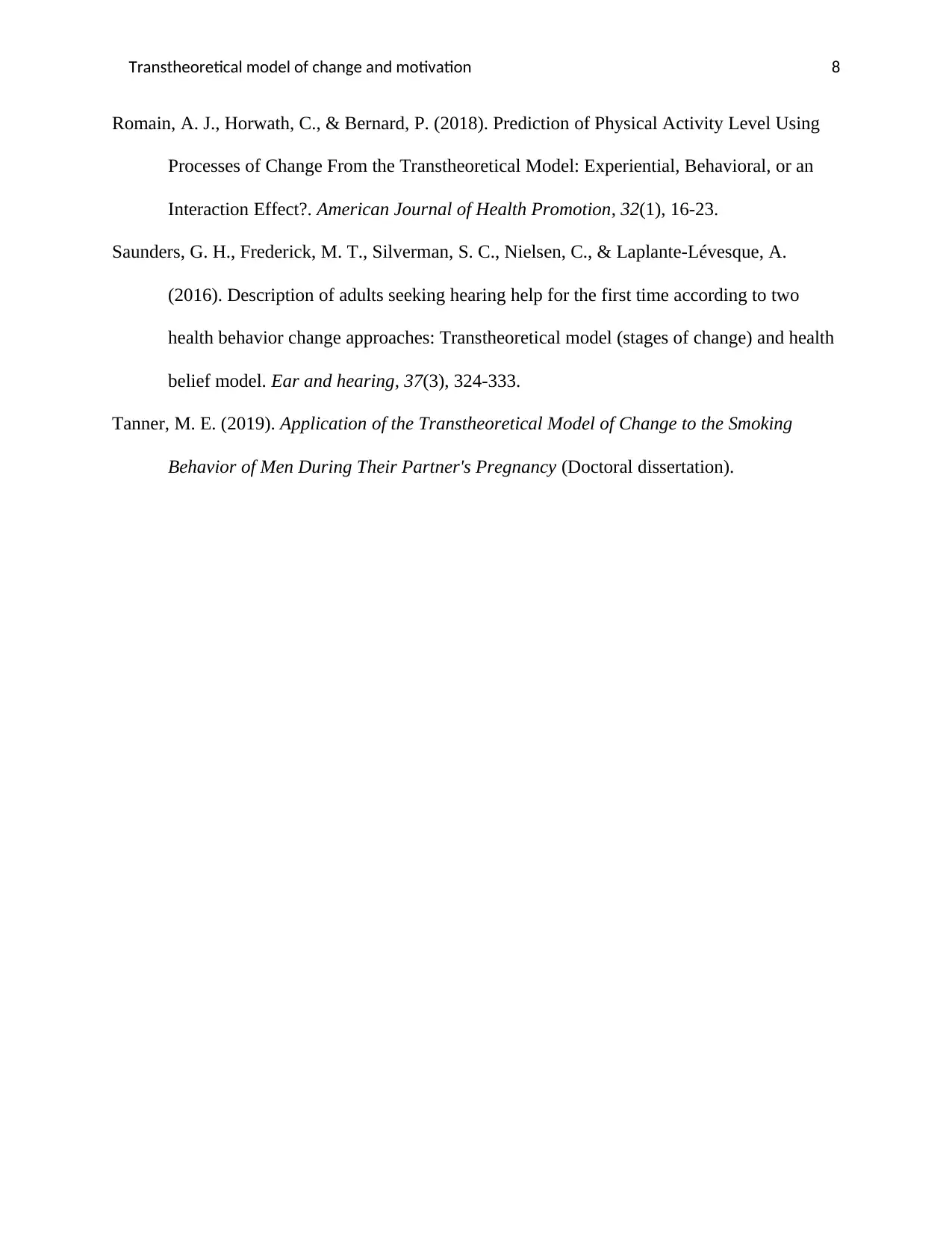
Transtheoretical model of change and motivation 8
Romain, A. J., Horwath, C., & Bernard, P. (2018). Prediction of Physical Activity Level Using
Processes of Change From the Transtheoretical Model: Experiential, Behavioral, or an
Interaction Effect?. American Journal of Health Promotion, 32(1), 16-23.
Saunders, G. H., Frederick, M. T., Silverman, S. C., Nielsen, C., & Laplante-Lévesque, A.
(2016). Description of adults seeking hearing help for the first time according to two
health behavior change approaches: Transtheoretical model (stages of change) and health
belief model. Ear and hearing, 37(3), 324-333.
Tanner, M. E. (2019). Application of the Transtheoretical Model of Change to the Smoking
Behavior of Men During Their Partner's Pregnancy (Doctoral dissertation).
Romain, A. J., Horwath, C., & Bernard, P. (2018). Prediction of Physical Activity Level Using
Processes of Change From the Transtheoretical Model: Experiential, Behavioral, or an
Interaction Effect?. American Journal of Health Promotion, 32(1), 16-23.
Saunders, G. H., Frederick, M. T., Silverman, S. C., Nielsen, C., & Laplante-Lévesque, A.
(2016). Description of adults seeking hearing help for the first time according to two
health behavior change approaches: Transtheoretical model (stages of change) and health
belief model. Ear and hearing, 37(3), 324-333.
Tanner, M. E. (2019). Application of the Transtheoretical Model of Change to the Smoking
Behavior of Men During Their Partner's Pregnancy (Doctoral dissertation).
1 out of 8
Related Documents
Your All-in-One AI-Powered Toolkit for Academic Success.
+13062052269
info@desklib.com
Available 24*7 on WhatsApp / Email
![[object Object]](/_next/static/media/star-bottom.7253800d.svg)
Unlock your academic potential
© 2024 | Zucol Services PVT LTD | All rights reserved.




